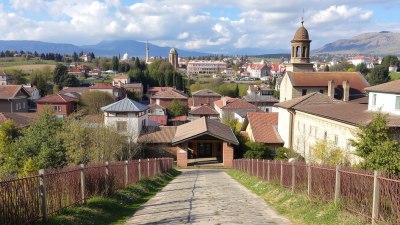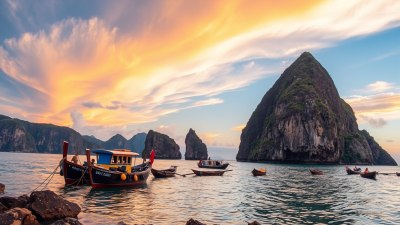Solo Travel to Remote Destinations: What to Know
Explore essential tips and insights for solo travel to remote destinations safely and enjoyably.

Image created with Flux Schnell
Traveling alone can be an enriching experience, particularly when visiting remote destinations that offer tranquility, natural beauty, and unique cultural insights. While the idea of solo travel sparks excitement, it also brings about concerns and questions regarding safety, planning, and maximizing experiences. This guide aims to provide valuable tips for embarking on a solo journey to some of the world's most remote and beautiful locations, ensuring you make the most of your adventure without compromising your safety or enjoyment.
Choosing Your Destination
When selecting a remote destination for solo travel, it's important to consider various factors including safety, accessibility, and local culture. Locations like Iceland, Patagonia, or the remote islands of the Philippines offer incredible experiences but differ significantly in terms of infrastructure and safety. Researching a destination’s history with tourism can give you insight into how solo travelers are perceived and treated. Understanding the local customs and language can also enhance your experience and help you connect better with the locals.
Preparation is Key
Before setting off on your adventure, thorough preparation is essential. Start with a comprehensive travel plan that includes your itinerary, transportation, accommodation, and activities. Keep track of local emergency numbers, the nearest embassy, and healthcare facilities in case you need assistance. Pack wisely, focusing on essential items like first-aid kits, necessary medicines, and local maps or offline navigation tools. Don’t forget to have a backup plan for your itinerary as well to adapt to unforeseen circumstances.
Safety First
Although traveling solo can be safe, remaining vigilant is critical when exploring remote areas. Maintain awareness of your surroundings, trust your instincts, and avoid risky situations. Inform someone about your travel plans and check in with them regularly if possible. Investing in travel insurance is also advisable, covering both health emergencies and trip cancellations. Solo travelers should pay attention to their personal belongings; using anti-theft bags and avoiding flashy items can help keep you out of unwanted situations.
Local Transportation
Getting around in remote destinations may not be as straightforward as in urban areas. Be sure to research local transportation options, such as buses, cabs, or rental vehicles. In some cases, hitchhiking is a common way to travel in certain regions, but assess the safety of doing so in your chosen area. When renting a vehicle, check local driving laws and road conditions as they may vary. This preparation will not only enhance your experience but increase your comfort level navigating through rural settings.
Accommodation Choices
Accommodation can significantly influence your travel experience. Opt for places that promote safety and social interactions such as hostels, eco-lodges, or guesthouses. These accommodations may provide opportunities to meet fellow travelers and share experiences, enriching your solo journey. Online reviews can help gauge the safety, cleanliness, and reputation of a place. Additionally, consider staying with locals via platforms like Airbnb, as it often provides a unique cultural exposure.
Engaging with Local Culture
One of the greatest advantages of solo travel is the chance to immerse yourself in local culture. Take the time to learn a few key phrases in the local language; it often goes a long way in establishing rapport with locals. Attend cultural events, try local dishes, and visit local markets. Be open to experiencing the way of life that differs from your own; it can spark friendships and lead to memorable encounters. Participating in workshops or local activities can also enhance your understanding of the culture and create lasting memories.
Stay Connected, But Not Too Much
While staying connected with friends and family is vital for safety, over-relying on technology can detract from your experience. Use your smartphone for navigation, but balance that with enjoying your surroundings. Setting aside moments to disconnect from the digital world allows you to engage more with the local environment and people. Share your adventure through posts or messages at designated times to keep your loved ones updated without neglecting your travel experience.
Documenting Your Journey
Documenting your travel experiences can be incredibly rewarding. Journaling or blogging about your experiences can help you reflect on your journey and keep memories alive. Creative outlets like photography can also allow you to capture the beauty of remote landscapes. Remember to enjoy the sights while creating your own collection of experiences. If comfortable, sharing your journey online can inspire others to take similar trips or offer tips based on your experiences.
Embracing Solitude
While the idea of being alone might seem daunting at first, it can also lead to profound personal insights and growth. Take time to reflect during your travels; quiet moments can foster creativity and self-awareness. Visit tranquil locations such as nature reserves or beaches where you can find peace in solitude. Remember, solo travel is also about discovering who you are beyond your daily routine.
Environmental Considerations
Responsible travel is crucial, particularly when visiting remote destinations that may be vulnerable to environmental degradation. Practice the principles of ‘Leave No Trace’ by minimizing waste, using reusable products, and respecting wildlife and local ecosystems. Support eco-friendly businesses and engage in activities that preserve and honor the natural environment you’re enjoying. Being a conscious traveler helps ensure that these beautiful destinations remain pristine for future generations.
Local Cuisine Adventures
Diving into the local cuisine can be one of the most enjoyable activities while traveling solo. Exploring food markets, local restaurants, and even cooking classes can enhance your cultural experience. Don't hesitate to sample street food, which often reflects the essence of local flavors. Engaging with chefs and locals about their culinary practices may introduce you to new dishes and cooking methods, enriching your understanding of the culture through its culinary delights.
Personal Safety Measures
In addition to being aware of your surroundings, implementing personal safety measures can give you peace of mind. Carry a personal safety alarm, familiarize yourself with local emergency services, and trust your instincts when meeting new people. Avoid discussing your solo travel status with strangers unless you feel comfortable. Planning your activities in advance can also help avoid wandering into unsafe areas after dark and enhance your overall comfort level on the trip.
Solo travel to remote destinations opens a doorway to unique adventures, personal growth, and incredible memories. With careful planning, awareness, and a spirit of curiosity, you can explore the unexplored and connect with the beauty of our planet. Always keep in mind that you are not just visiting a destination; you are immersing yourself in a world rich with traditions, unique stories, and vibrant landscapes that can leave lasting impressions on your life. Embrace the experience, stay safe, and embark on your solo travel journey with enthusiasm for the adventures that lie ahead.











